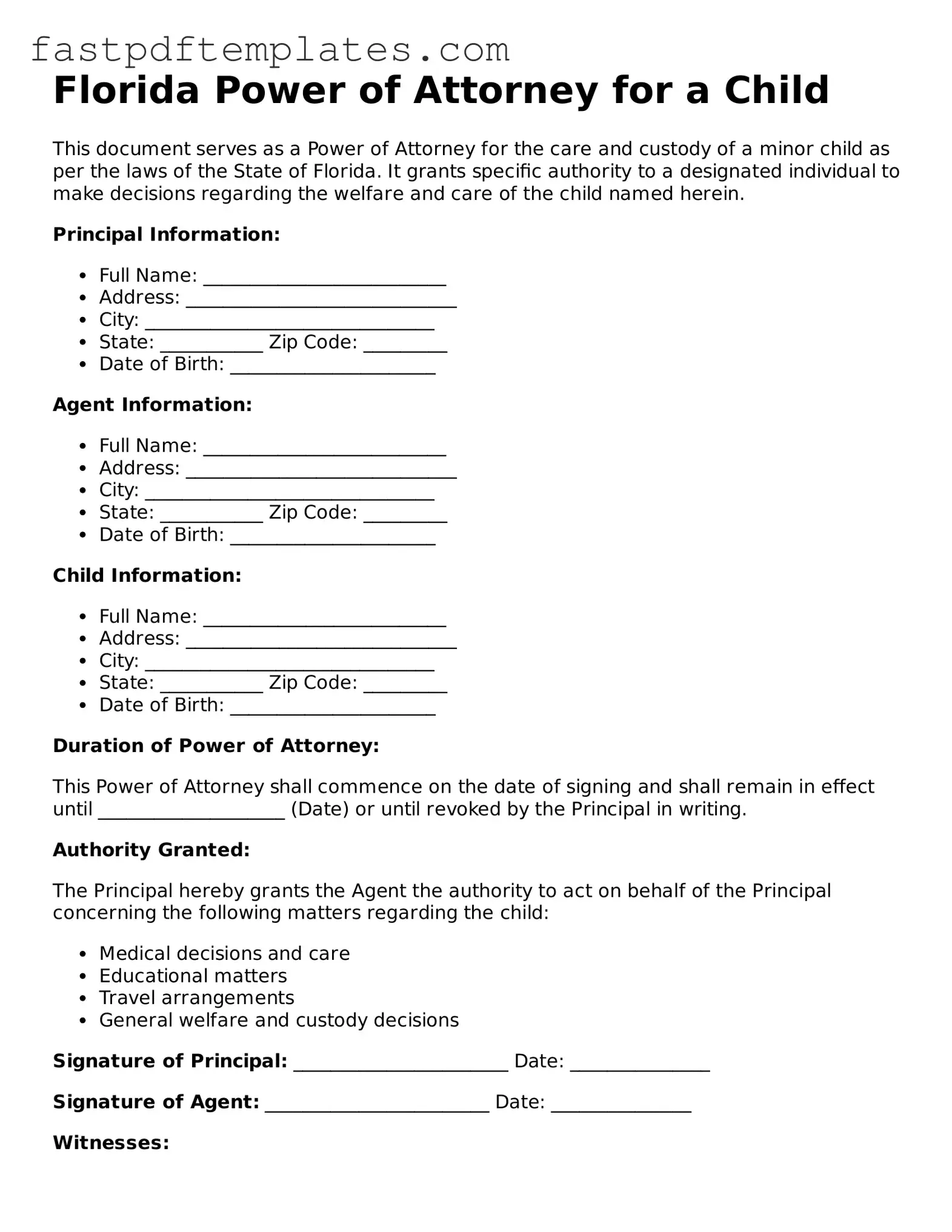The Florida Power of Attorney for a Child form is similar to a general Power of Attorney form. Both documents allow an individual to grant authority to another person to make decisions on their behalf. While the general Power of Attorney can cover a wide range of matters, the one for a child specifically focuses on decisions related to the care and welfare of a minor. This includes education, healthcare, and other important aspects of a child's life.
Another document that resembles the Florida Power of Attorney for a Child is the Child Custody Agreement. This agreement outlines the rights and responsibilities of parents or guardians regarding the care of a child. Like the Power of Attorney, it addresses who can make decisions for the child. However, a custody agreement typically arises during divorce or separation proceedings and is more focused on living arrangements and visitation rights.
The Guardianship Agreement is also similar. It establishes a legal relationship where one person is appointed to take care of a child. This document grants broader authority than a Power of Attorney, often including long-term custody and legal responsibilities. While both documents aim to protect the child's interests, a guardianship is more permanent and may involve court approval.
The Medical Authorization form shares similarities with the Power of Attorney for a Child as well. This document allows a parent or guardian to authorize medical treatment for a child. It is often used in emergencies when immediate medical decisions are necessary. Both forms ensure that someone can act on behalf of the child, but the Medical Authorization is specifically focused on healthcare decisions.
The Temporary Custody Agreement is another related document. This agreement allows a caregiver to take temporary custody of a child, usually for a short period. It is often used in situations where parents are unable to care for their child. Like the Power of Attorney for a Child, it allows someone other than the parent to make decisions for the child, but it is typically for a limited time.
The Child Care Authorization form is also comparable. This document allows a parent to give permission for someone to care for their child. It is often used for daycare or school situations. Similar to the Power of Attorney for a Child, it grants authority to another person, but it may not cover as many areas of decision-making.
The Adoption Agreement is another document that has some similarities. It legally transfers parental rights from one individual or couple to another. While the Power of Attorney for a Child is temporary and can be revoked, an adoption is a permanent change in the child's legal status. Both documents involve the care of a child, but they differ significantly in their intent and duration.
The Release of Liability form is also relevant. This document is often used by parents when allowing their child to participate in activities that may involve some risk, such as sports or field trips. While it does not grant decision-making authority, it does ensure that the caregiver can act in the child's best interest. Both forms aim to protect the child, but they serve different purposes.
The Child Support Agreement is another document that can be compared. It outlines the financial responsibilities of parents for the care of their child. While it does not provide decision-making authority, it is essential for ensuring that a child's needs are met. Both documents emphasize the importance of a child's well-being, though they address different aspects of care.
Lastly, the Special Needs Trust is similar in that it focuses on the care of a child, particularly those with disabilities. This document allows funds to be set aside for the child's future needs without affecting their eligibility for government benefits. Like the Power of Attorney for a Child, it is designed to ensure that the child's best interests are prioritized, but it does so through financial planning rather than decision-making authority.

